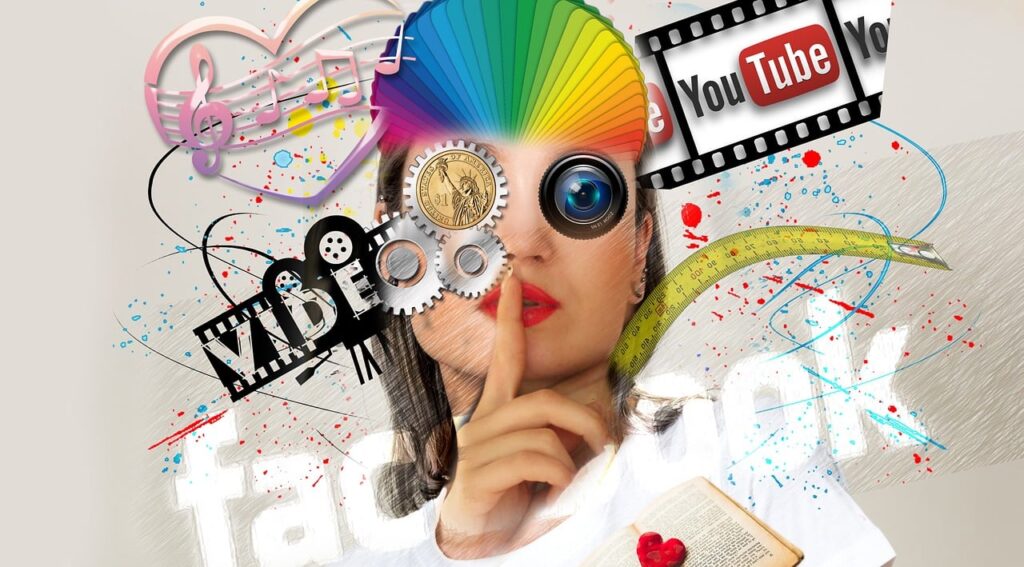Social media is a powerful tool that shapes how we connect, communicate, and represent ourselves. For women, it has become a double-edged sword – an arena of empowerment and visibility on one side, and a space rife with objectification and harmful stereotypes on the other. Platforms like Instagram, TikTok, and Facebook offer opportunities to amplify women’s voices and advocate for gender equality. However, they also expose women to unrealistic beauty ideals, harassment, and commodification.
This blog explores the dual nature of social media’s impact on women. By examining its role in empowerment, objectification, and feminist activism, we aim to provide actionable guidance on fostering a healthier, more empowering online environment.
Table of Contents
ToggleEmpowerment Through Visibility: Positive Influences of Social Media
Social media has revolutionized visibility for women in ways unimaginable just a decade ago. Platforms like Instagram and LinkedIn allow women to build personal brands, showcase achievements, and inspire others. Women who were previously underrepresented in traditional media – such as women of color, LGBTQ+ women, and women with disabilities – find their voices amplified online.
Women Leading the Conversation
Social media enables women to discuss issues such as body positivity, reproductive rights, and pay equity on a global scale. For instance, movements like #MeToo and #TimesUp have reached millions of people, transforming personal stories into collective advocacy.
Through platforms like Twitter and Instagram, countless women entrepreneurs, activists, and influencers share stories that resonate. Profiles like @Nabela on Instagram celebrate self-love and cultural pride, while TikTok creators like Kimberly Foster (@KimberlyNFoster) discuss feminist topics with intelligence and relatability.
Highlighting Achievements
Social media is also a springboard for celebrating female achievements in careers, sports, arts, and science. Initiatives like #ILookLikeAnEngineer and #WomenWhoCode have proven instrumental in challenging gender biases in STEM fields by spotlighting women’s contributions.
Women now have spaces where their stories can take center stage, inspiring change and fostering solidarity. This role of social media cannot be overstated – it has truly democratized representation.
Objectification: The Dark Side of Social Media
For all the empowerment it offers, social media has also perpetuated harmful norms. Platforms often prioritize visual content, leading to an overwhelming emphasis on how women look rather than what they achieve. This focus fuels objectification, unrealistic beauty standards, and the commodification of women’s bodies.
Perpetuating Unrealistic Standards
Photoshop-perfect bodies dominate feeds, projecting an unattainable image of beauty that affects self-esteem, particularly among younger women. Trends like #ThatGirl or #GlowUp often promote toxic notions of self-improvement rooted in appearance rather than well-being.
Even viral “before and after” posts, while intended to inspire, can serve as reminders of societal pressure to conform to specific standards. Many women internalize these expectations, leading to heightened insecurities and, in extreme cases, eating disorders or mental health struggles.
Harmful Viral Trends
Social media has also seen problematic trends emerge, disguised as entertainment or challenges. Examples include:
- “Hot or Not” filters on platforms like TikTok, which rate attractiveness based on arbitrary algorithms.
- Hashtags like #PerfectWaist challenge women to measure up to standards that are inherently damaging.
These trends not only encourage objectification but also trivialize women’s sense of worth, reducing them to sets of physical features rather than full, multidimensional individuals.
The Role of Feminist Activism on Social Media
Even amid its pitfalls, social media is an essential tool for feminist activism. Activists use it to challenge oppression, build solidarity, and advocate for systemic change.
Successful Campaigns
Movements like #MeToo and #HeForShe illustrate social media’s power. Through shared hashtags, women worldwide have brought their experiences with harassment and violence into public discourse, holding individuals and institutions accountable. Importantly, these movements have gone beyond just awareness – they’ve led to tangible outcomes, like policy changes and high-profile resignations.
Another notable example is the #BodyPositivity movement, which promotes acceptance for all body types. Models like Tess Holliday and activists like Jameela Jamil have used platforms like Instagram to challenge narrow beauty ideals and encourage self-love, impacting millions of followers.
Building Communities
Social media fosters supportive communities where women connect, share, and learn. Facebook groups like “Beyoncé’s Internet” and Twitter accounts like @EverydaySexism provide spaces to share experiences, exchange advice, and organize around shared goals. These online communities are invaluable lifelines for women who might otherwise feel isolated.
Strategies for Building a More Empowering Social Media Environment
Creating a healthier and more empowering social media ecosystem requires collective effort. Here are actionable strategies for individuals, creators, and platforms:
For Individuals
- Curate Your Feed: Follow accounts that inspire and uplift you. Avoid content that reinforces unhealthy comparisons.
- Engage Constructively: Be mindful of how your interactions affect others – choose positivity over passive negativity or trolling.
- Educate Yourself: Before sharing content or engaging in debates, ensure that your perspective is informed by credible sources.
For Content Creators
- Diversify Representation: Create content that celebrates diverse identities and body types.
- Challenge Norms: Use your platform to advocate for change rather than perpetuating harmful trends.
- ** Foster Meaningful Conversations**: Encourage dialogue in your comments section.
For Platforms
- Enforce Community Guidelines: Develop and implement strict measures to combat harassment and abusive behavior.
- Demote Harmful Content: Alter algorithms that promote objectification, focusing instead on content that educates or inspires.
- Enhance Transparency: Share insights into how harmful trends are identified and mitigated.
The Path Forward: A Social Media Landscape That Empowers Women
Social media is a complex, multifaceted space for women. It holds enormous promise as a tool to amplify voices, spotlight achievements, and foster activism. Yet, it can also be a stage where harmful stereotypes and unrealistic expectations perpetuate.
The role we all play in shaping this digital ecosystem is more significant than it seems. Every post, like, share, and comment contributes to creating an online world where women are empowered rather than objectified. By being strategic, kind, and thoughtful in how we engage, and by urging platforms to take responsibility for their policies, we can create a welcoming space for everyone.
Empowered women empower the world – both on and offline – Hustling Naari.



7 thoughts on “Social Media’s Role in Empowering and Objectifying Women”
Can you be more specific about the content of your article? After reading it, I still have some doubts. Hope you can help me.
Can you be more specific about the content of your article? After reading it, I still have some doubts. Hope you can help me.
Thanks for sharing. I read many of your blog posts, cool, your blog is very good.
Your point of view caught my eye and was very interesting. Thanks. I have a question for you.
Your article helped me a lot, is there any more related content? Thanks!
Thanks for sharing. I read many of your blog posts, cool, your blog is very good.
Your article helped me a lot, is there any more related content? Thanks!